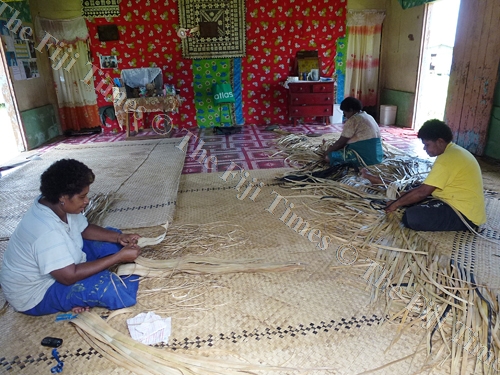WHEN villagers of Malawai in Gau say “dra na yame” or bleeding tongue, they’re not referring to some frightening disease — but it’s just a joke to warn people that they are serving small, bony fish which could hurt their tongues, if not careful.
But it’s gallow’s humour as the issue of declining fish stocks in Fiji is no laughing matter. With the catches unreliable, villagers are frequently having to find other means to earn income as meeting their needs gets harder and harder .
Vasemaca Aditukana of Malawai Village and Liviana Mataiciwa from the neighbouring village of Lamiti, have been weaving mats to meet their needs. Vasemaca recalls, in her first year in Malawai after she got married, the phrase “dra na yame” was never heard.
“I was brought up on the island of Nairai, which is wellknown for its abundant fish and when I came to Malawai it wasn’t that bad. Fish that we caught in those days were bigger, although our shores here when compared with other villages in Gau, was not as productive,” she said.
“Today, we are catching a lot of smaller fish and they are not as big as the ones in those days. That’s the reason we call these fish ‘dra na yame’.”
Liviana Mataiciwa, who lives in the neighbouring village of Lamiti, faces the same situation.
Her family moved back to the village after they realised city life was too harsh.
Both these women say their families did not depend on the sea for a living because it has not been able to help fully meet their needs and obligations. Their husbands toil the land and their main commodity is yaqona while they plant other crops for daily consumption.
However, it takes three to four years before it can be harvested and that’s why they are weaving mats.
“We don’t depend on the sea for a living because there is not much fish to sell. Although, we have a tabu area in our fishing grounds and there isn’t enough for all of us to depend on the sea. Those who sell fish have to resort to night diving because it’s easier.”
Fortunately for Liviana, she made the decision to learn how to weave when she moved back to the village. Her children have now moved back to Suva to attend high school and are living with her sister.
She visits them now and then to bring them food and sell mats to financially support them.
“In one trip alone, I can pay for what they need from the mats I sell. I can make $2000 in one trip to Suva, so I pay what is needed and with the rest of the money, I buy our food ration to take back to the village,” she said.
“It takes three years before the yaqona can be harvested and we have lots of needs for our family which cannot be ignored. “We cannot depend on the sea and that’s the reason I have been weaving mats for the last nine years, and to enable us pay for our children’s education needs,” said Liviana.
Today, like Liviana, many other women in her village are selling mats to help support their families financially. And these days, the people of Malawai are not the only ones experiencing this problem.
The Ministry of Fisheries last year launched the Set Size campaign, an initiative to revive Fiji’s declining fish stocks.
Part of the campaign, outreach is sharing stories from all over Fiji, to help ensure people understand how serious the problem is and prioritise the solutions along with other pressing issues, such as infrastructure and health care.
Nowadays, all across the country, fishermen are having a harder and harder time meeting their needs from the sea.
Villagers are going further out and it’s taking longer to bring home a catch. n Alumeci Nakeke is the communications officer for change.




